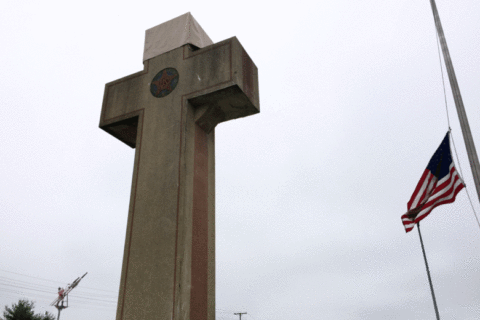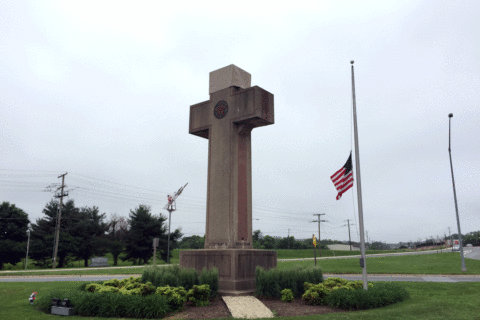WASHINGTON (AP) — The Supreme Court agreed Friday to hear a case about whether a nearly 100-year-old, cross-shaped war memorial located on a Maryland highway median violates the Constitution’s required separation of church and state, a case that could impact hundreds of similar monuments nationwide.
A federal appeals court in Virginia had previously ruled against the approximately four-story-tall cross. The judges said that it “has the primary effect of endorsing religion and excessively entangles the government in religion.”
But, the Maryland officials who maintain the memorial told the Supreme Court that the monument’s context and history show it is intended to convey a secular message of remembrance, not a religious message.
They said the appeals court’s decision would “compel the removal or dismemberment of a cherished war memorial that has served as a site of solemn commemoration and civic unity for nearly a century.”
In urging the high court to take the case, officials argued that the lower court’s decision puts at risk hundreds of other monuments nationwide.
“We’re very grateful that the Supreme Court has agreed to hear this case,” said Jeremy Dys, deputy general counsel for First Liberty Institute. The First Liberty Institute is representing the American Legion, which is seeking to have the lower court’s rulings overturned.
Dys said if the rulings would be allowed to stand, it would set a dangerous precedent for other war memorials around the nation. “If the other side actually were successful in this lawsuit, what that would unleash is a bulldozer, which would run from coast to coast,” Dys said.
The approximately 40-foot-tall cross at the center of the case is located in Bladensburg, Maryland, about 5 miles from the Supreme Court. Sometimes called the “Peace Cross,” it was completed in 1925, and it honors 49 men from the surrounding county who died in World War I. A plaque on the cross’ base lists the names of those soldiers, and both faces of the cross have a circle with the symbol of the American Legion, the veterans organization that helped raise money to build it.
Today, responsibility for the cross falls to a Maryland parks commission that took over ownership and maintenance of it in 1961 because of traffic safety concerns. The massive concrete structure could be dangerous to motorists if it were to fall or crumble.
The monument’s supporters said the Supreme Court has previously made clear that monuments, particularly longstanding ones, that incorporate religious symbolism to send a secular message don’t violate the Constitution. They said the Bladensburg monument’s history and context show that it falls into that category, that its message is a secular one of commemoration.
The monument’s shape was chosen not for religious reasons but to mirror cross-shaped grave markers used for soldiers buried in American cemeteries overseas, backers note.
And, in the decades since the monument was built, other memorials have been constructed nearby, including a World War II memorial, a memorial honoring veterans of the Korean and Vietnam wars and a 9/11 memorial.
The D.C.-based American Humanist Association has led the challenge against the monument. The organization and three area residents sued Maryland officials in 2014.
They said that the cross “discriminates against patriotic soldiers who are not Christian, sending a callous message to non-Christians that Christians are worthy of veneration while they may as well be forgotten.” And, they point out that other nearby memorials are smaller and across the street from the cross.
Monica Miller, senior counsel for the American Humanist Association, said they are ready to defend the rulings and take their case to the high court.
“It’s a little disappointing that the Supreme Court wants to hear the case, but I think our legal arguments are sound and we look forward to presenting them to the court,” Miller said.
With the recent confirmation of Supreme Court Justice Brett Kavanaugh, the organization will have to gain the support of at least one of five conservative justices on the court.
“I think it’s going to be a little bit more of an uphill battle, for sure,” Miller said.
Though a trial court judge ruled the memorial was constitutional, an appeals court disagreed in a 2-1 ruling in October 2017.
In urging the Supreme Court not to take the case, the American Humanist Association argued that the appeals court’s ruling is specific to the Bladensburg memorial and doesn’t threaten any other monuments.
___
Associated Press reporter Mark Sherman contributed to this report. WTOP’s Mike Murillo also contributed to this report.
___
Follow Jessica Gresko on Twitter at http://twitter.com/jessicagresko
Copyright © 2026 The Associated Press. All rights reserved. This material may not be published, broadcast, written or redistributed.







